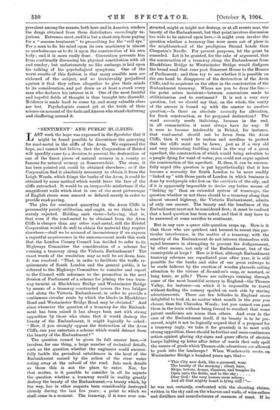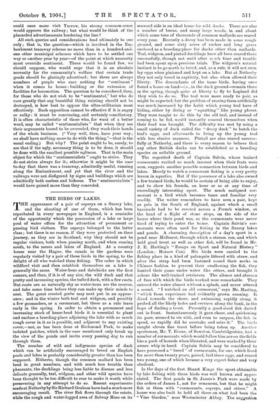L AST week the hope was expressed in the Spectator that
it might be found possible to discontinue the quarrying for road-metal in the cliffs of the Avon. We expressed the hope, and cannot but believe, that the Corporation of Bristol will speedily come to a decision to prevent the destruction of one of the finest pieces of natural scenery in a county so famous for natural scenery as Somersetshire. The stone, it
• has been pointed out, could be obtained elsewhere ; or if the Corporation find it absolutely necessary to obtain it from the Leigh Woods, which fringe the banks of the Avon, it could be obtained by some method which would leave the face of the cliffs untouched. It would be an irreparable misfortune if the magnificent walls which shut in one of the most picturesque of English rivers were scarred or defaced merely in order to provide road-paving.
The plea for continued quarrying in the Avon Cliffs is presumably purely utilitarian, and ought, as we think, to be sternly rejected. Holding such views—believing, that is, that even if the road-metal to be obtained from the Avon Cliffs is cheaper than any other road-metal, still the Bristol Corporation would do well to obtain the material they require elsewhere—shall we be accused of inconsistency if we express a regretful acquiescence in the announcement made this week that the London County Council has decided to refer to its Highways Committee the consideration of a scheme for running a tramway along the Victoria Embankment? The exact words of the resolution may as well be set down here. It was resolved : "That, in order to facilitate the traffic re- quirements of South London and the general public, it be referred to the Highways Committee to consider and report to the Council with reference to the promotion in the next Session of Parliament of a scheme for joining the two tram- way termini at Blackfriars Bridge and Westminster Bridge by means of a tramway constructed across the two bridges and along the Victoria Embankment, in order to provide a continuous circular route by which the blocks in Blackfriars Road and Westminster Bridge Road may be obviated." And since whenever the question of a tramway for the Embank- ment has been raised it has always been met with strong opposition by those who claim that it would destroy the beauty of the Embankment, it might logically be asked : "How, if you strongly oppose the destruction of the Avon Cliffs, can you entertain a scheme which would detract from the beauty of the Embankment ? "
The question cannot be given its full answer here,—it involves, for one thing, a large number of technical details, such as the question whether the engineers could success- fully tackle the periodical subsidences in the level of the Embankment caused by the action of the river water eating away at the subsoil of the road. Into such details as those this is not the place to enter. Nor, for that matter, is it possible to consider in all its aspects the question whether a tramway would in reality greatly destroy the beauty of the Embankment,—a beauty which, by the way, has in other respects been considerably destroyed already during the last few years ; a point to which we shall come in a moment. The tramway, if it were ever con-
struoted, might or might not destroy, or at all events mar, the beauty of the Embankment, but that point involves discussion too wide to be entered upon here,—it might even involve the question whether a tramway line were more out of place in the neighbourhood of the prodigious Strand hotels than Cleopatra's Needle. For present purposes, let the point be conceded. Let it be granted, for the sake of argument. that the construction of a tramway along the Embankment from Blackfriars Bridge to Westminster Bridge would disfigure the broad road that runs past Somerset House to the Houses of Parliament; and then try to see whether it is possible on the one hand to disapprove of the destruction of the Avon
Cliffs, and to acquiesce on the other in the construction of the Embankment tramway. Where are you to draw the line—
the point arises insistent—between concessions made to utilitarianism and to sentiment ? It is not a very easy question, but we should say that, on the whole, the sanity of the answer is bound up with the answer to another question,—Is there an absolute necessity for alteration, for fresh construction, or for proposed destruction? The word necessity needs italicising, because in the end, in all communities, it must always have its way. If it were to become intolerable in Bristol, for instance, that road-metal should not be hewn from the Avon Cliffs, then it would be useless and needless to protest that the cliffs must not be hewn ; just as if a very old and very interesting building stood in the way of a great aqueduct, the construction of which would bring salvation to a people dying for want of water, you could not argue against the construction of the aqueduct. If, then, it can be success- fully urged (the question is put hypothetically) that it has become a necessity for South London to be more readily "linked up" with those parts of London in which business is done by workpeople who live on the outskirts of the city, and if it is apparently impossible to devise any better means of "linking up" than an extended system of tramways, the question whether or not there should be a tramway along that almost unused highway, the Victoria Embankment, admits of only one answer. The beauty and the loneliness of the Embankment must not be considered first; it must be realised that a hard question has been asked, and that it may have to be answered at some sacrifice to sentiment.
But in any case a queer side-question crops up. How is it that those who are quickest and keenest to resent this par- ticular interference, in the matter of a tramway, with the sanctity of the Embankment do not interest themselves with equal keenness in attempting to prevent the disfigurement, by other means, not only of the Embankment, but of the countryside at large ? How is it that, although Embankment tramway schemes are repudiated year after year, it is still possible for the banks and sides of our great railways to be made hideous by the erection of wooden placards calling attention to the virtues of So-and-so's soap, or mustard, or lung tonic, or pills ? There are railways running through some of the most beautiful scenery in England—the Thames Valley, for instance—on which it is impossible to travel without finding the scenery spoiled on each side by staring advertisements. There are few hillsides in England more delightful to look at, no matter what month in the year you choose, than the Clieveden Woods ; but you cannot run past them in the train without being forced to recollect that some patent medicines are worse than others. And even in the case of the Embankment itself, if its beauty is to be pre- served, might it not be logically argued that if a proposal for a tramway (ugly, we take it for granted) is to meet with strong opposition, there should be further and more continuous action against glaring sky-signs and queer effects of electric lamps lighting up letter after letter of words that only spell the names of goods which Thames-side advertisers are allowed to push into the landscape ? When Wordsworth wrote, on Westminster Bridge a hundred years ago, that-
" This City now doth, like a garment, wear
The beauty of the morning; silent, bare, Ships, towers, domes, theatres, and temples lie
Open unto the fields, and to the sky ; Dear God ! the very houses seem asleep; And all that mighty heart is lying still ! "—
he was not, certainly, confronted with the shouting claims, written in the sky and on the wharves and walls, of wine-sellers and distillers and manufacturers of essences of meat. If he could once more visit Yarrow, his strong common-sense would approve the railway ; but what would he think of the placarded advertisements bordering the line ?
All such queries and considerations lead ultimately to one only ; that is, the question—which is involved in the Em- bankment tramway scheme no more than in a hundred-and- one other municipal schemes which have to be settled one way or another year by year—of the point at which necessity must override sentiment. There would be found few, we should suppose, who would urge that it is an absolute necessity for the community's welfare that certain trade goods should be glaringly advertised ; but there are always numbers of people who care nothing for "sentiment" when it comes to house - building or the extension of facilities for locomotion. The question to be considered, then, for those who do not wish to be "sentimental," but who do care greatly that any beautiful thing existing should not be destroyed, is how best to oppose the ultra-utilitarian most effectively. Such opposition cannot be effective if it is angry or sulky : it must be convincing, and certainly conciliatory. It is often characteristic of those who, for want of a better word, may be called " sentimentalists " that when they see their arguments bound to be overruled, they wash their hands of the whole business. (" Very well, then, have your way; we shall have nothing more to do with the thing,"—that is the usual ending.) But why The point ought to be, surely, to see that if the ugly, necessary thing is to be done, it should be done with the smallest possible ugliness. That is the main object for which the " sentimentalists " ought to strive. They do not strive always for it; otherwise it might be the case to-day that there was a tramway, admittedly useful, running along the Embankment, and yet that the river and the railways were not disfigured by signs and buildings which are admittedly both useless and hideous. The " sentimentalists " would have gained more than they conceded.











































 Previous page
Previous page